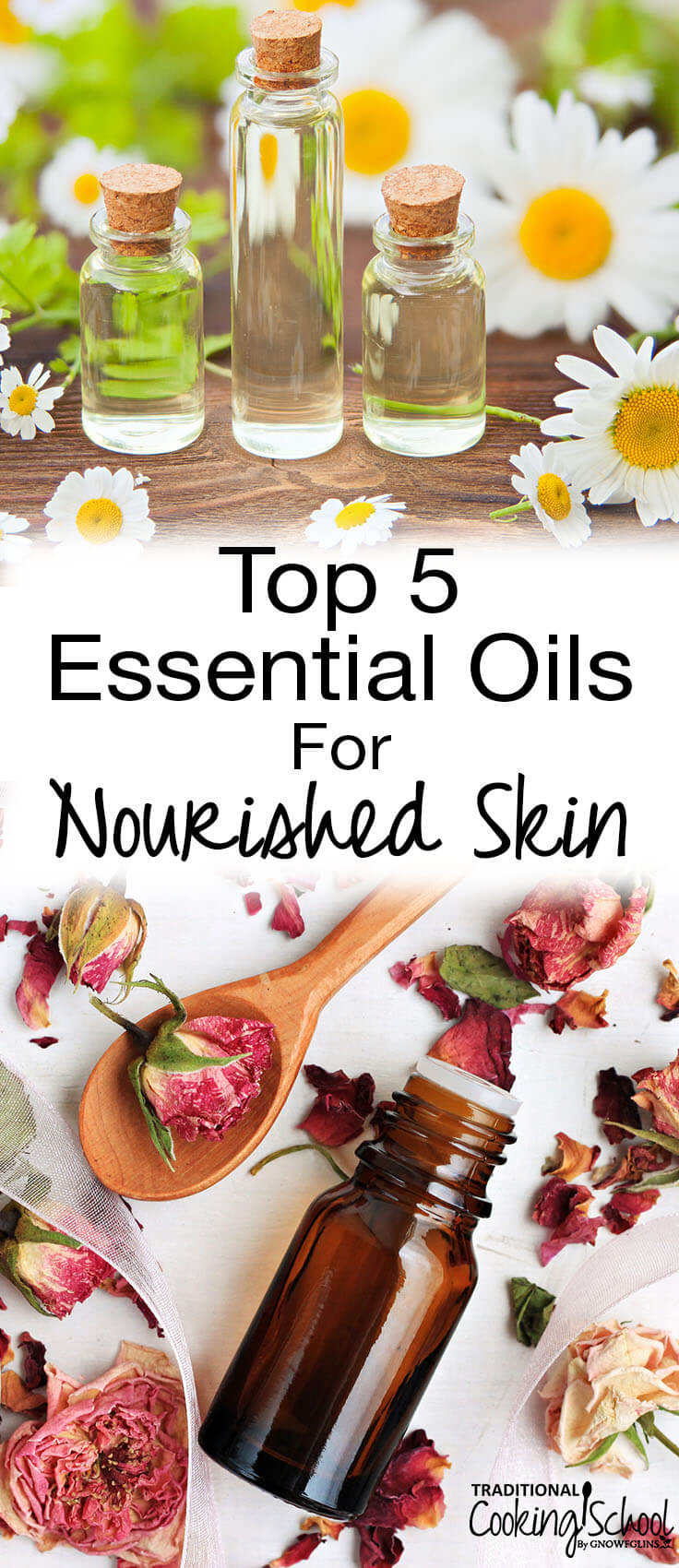
Let’s talk about essential oils for nourished skin…
And I don’t just mean for beauty!
After all, our skin is our largest organ, so we shouldn’t focus only on our faces.
These top 5 essential oils for nourished skin aren’t just for reducing wrinkles, acne, and inflammation (though they certainly do all those things!).
Rather, these essential oils cover the gamut of skin conditions — from itchy rashes and psoriasis to wound- and scar-healing. And yep, we’ll cover plenty of beauty applications, too, with these skin-nourishing essential oils!
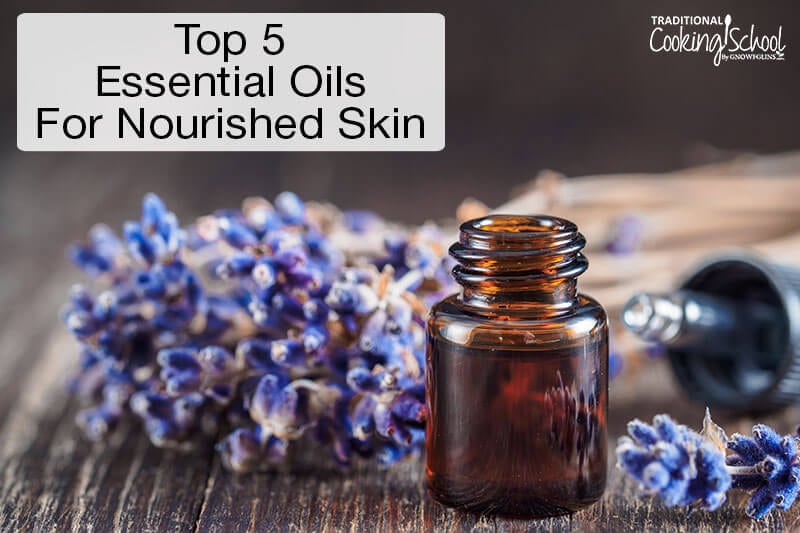
#1 — Lavender (Lavandula angustifolia)
Lavender essential oil has anti-inflammatory and antioxidant properties, making it ideal for treating a variety of skin conditions or just using in your regular skincare routine.
Lavender can calm itchy, irritated skin, soothe burns, and speed up wound healing. It’s also soothing on sunburns!
The antibacterial nature of lavender oil makes it perfectly suited to use as a natural antibiotic on cuts and scrapes. This property of lavender essential oil is enhanced when used with other antibacterial, anti-fungal oils, like clove, cinnamon, and tea tree (source).
Try including lavender in your skincare routine to reduce redness and help combat dry skin.
To use: Apply a drop of lavender essential oil to cuts and scrapes, burns, and/or bruises for cleaning and pain relief. Add several drops of lavender to homemade body butter and use all over or add a few drops to a hot bath. Also, apply a drop or two to a cotton ball or make a lavender roll-on to swipe over rashes or acne-prone areas. Dilute in a carrier oil and apply to sunburned skin as often as needed. Lastly, try lavender in a homemade massage oil.
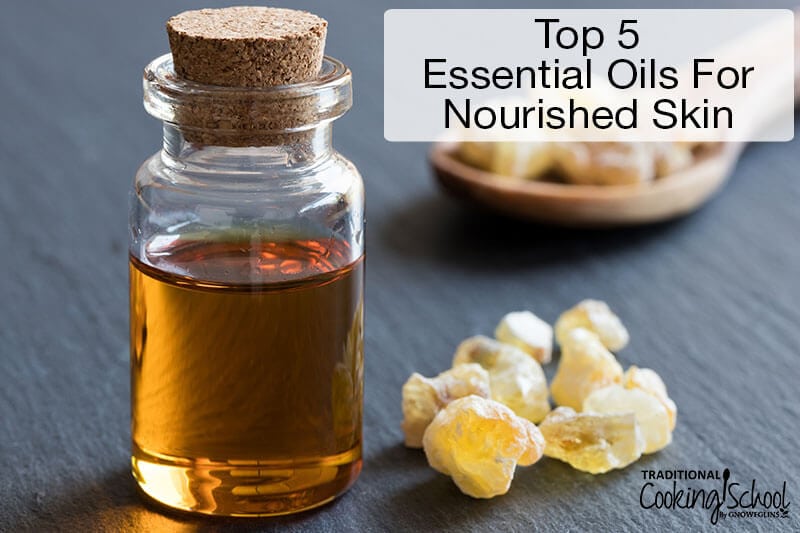
#2 — Frankincense (Boswellia carterii)
Frankincense essential oil is my personal favorite for natural skincare!
One of the most precious and effective essential oils, frankincense is a superstar in skincare. Its anti-inflammatory properties reduce redness and swelling, especially on the face. Furthermore, it assists in wound healing and may reduce the appearance of scars, stretch marks, and lighten age spots. (Source.)
Frankincense actually helps in cell regeneration and in keeping existing cells healthy (source)! It also blends beautifully with all of the skin-nourishing essential oils listed here.
To use: Creating a skin-healing Sea Buckthorn & Frankincense Face Serum to use for daily skincare. Massage frankincense essential oil (NEAT or diluted) on to scars or stretch marks. Add frankincense to a roll-on and apply over any area of your skin that needs attention or healing. Or, try adding it to a homemade massage oil.
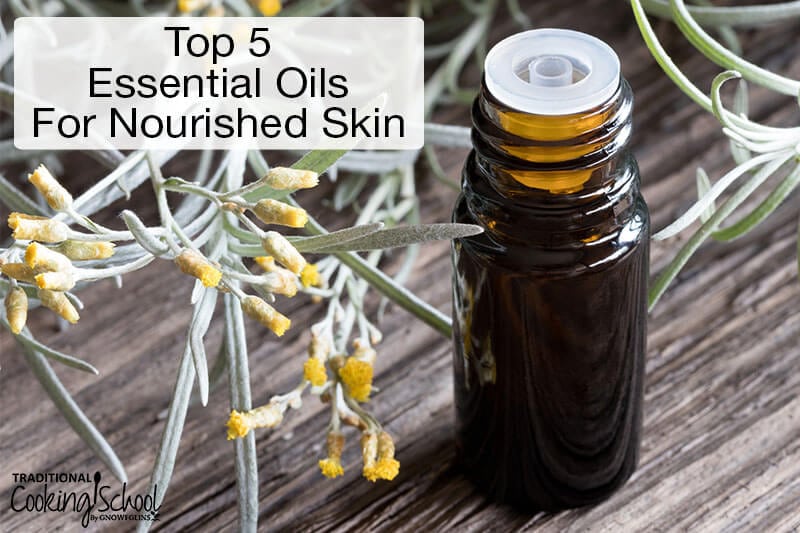
#3 — Helichrysum (Helichrysum italicum)
Helichrysum essential oil comes from an herb native to Western Europe. It is one of the most costly and precious essential oils — yet its benefits are second to none.
It can be applied to any sort of skin opening that is vulnerable to infection, such as cuts, bug bites, or open sores to protect the skin from infection and sepsis. For healing scar marks and spots left by pox, ulcers, or boils, reach for helichrysum!
Helichrysum can also help with dry skin and skin cracking by helping the skin retain moisture.
Finally, helichrysum essential oil promotes overall skin cell health by stimulating the production of new, healthy skin cells. (Source.)
To use: Apply a drop of undiluted oil to the affected area or add a drop or two to a relaxing bath. Add helichrysum to homemade body butters or salves, or mix in a roll-on with other skin-friendly oils.
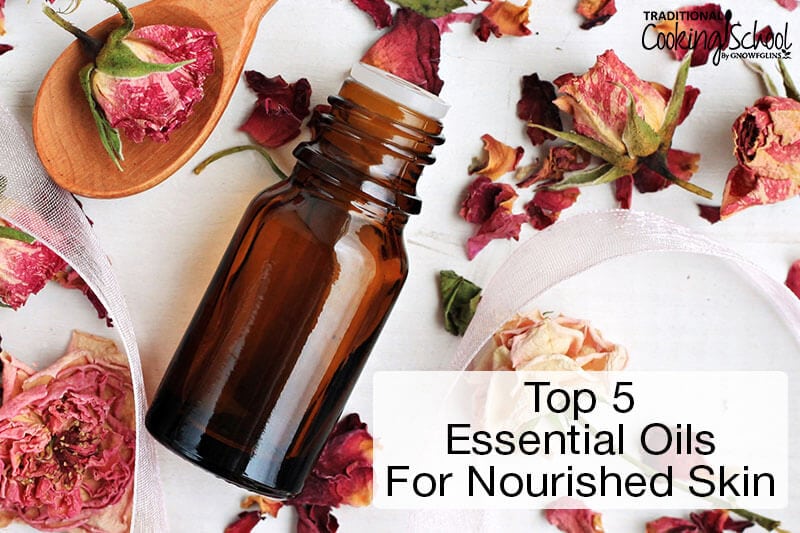
#4 — Rose (Rosa x damascena)
Rose essential oil is a powerhouse for the skin — both for treating skin conditions (like acne) and for maintaining youthful-looking skin.
Rose oil actually increases the skin’s permeability. In fact, when rose is added to beauty products (as it often is), it increases the skin’s absorption of nutrients and chemicals — all the more reason to choose homemade or all-natural skincare products! (Source.)
Rose oil is extremely antimicrobial and great for all ages and skin types, but especially dry, mature skin (source). If you’re a DIY beauty enthusiast, rose essential oil is one you’ll want to add to all your homemade lotions, body butters, and serums! Beware: rose oil is extremely expensive, so you may want to reserve it for therapeutic use rather than daily use.
To use: Dab a drop of rose essential oil to acne spots and blemishes up to three times per day. Dilute 1:5 with a carrier oil and apply liberally to the face, neck, chest, and/or back, or wherever your skin needs brightening or healing. Or, add a few drops to homemade beauty products.
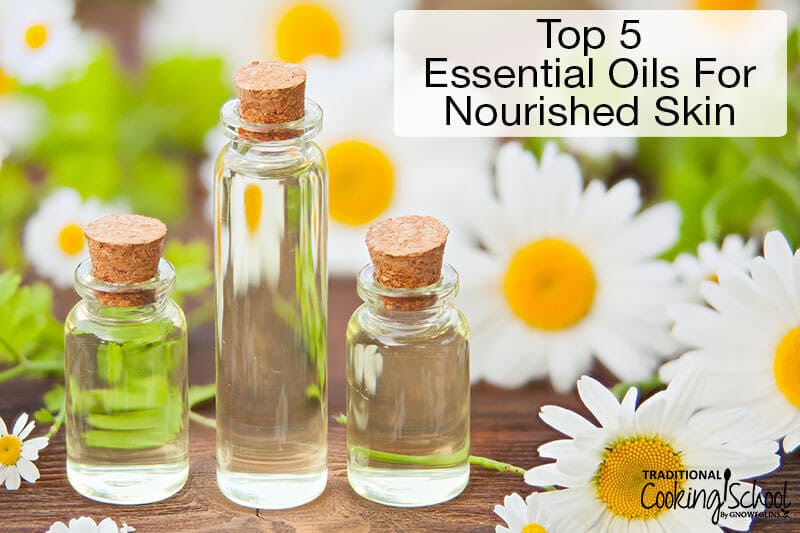
#5 — Roman Chamomile (Anthemis nobilis)
Roman chamomile essential oil has a lovely, light floral scent and is super soothing for irritated skin. It’s an excellent choice for rashes and eczema, or just stressed out, tired skin. (Source.)
Because it’s anti-inflammatory and antibacterial, Roman chamomile essential oil can serve as a natural remedy for skin ulcers, wounds, gout, bruises, burns, cracked nipples, diaper rash, and poison ivy (source). Roman chamomile blends well with other skin-friendly oils, such as lavender, frankincense, and geranium.
To use: Place 2 to 3 drops of Roman chamomile essential oil onto a cotton ball and lightly dab over the affected area. Add a drop to your face wash. This oil can be applied undiluted (NEAT), however those with very sensitive skin should dilute the oil in a carrier oil, such as coconut oil, avocado oil, or jojoba oil.
Nourished Skin Essential Oils: Honorable Mentions
Essential oils are amazing for natural skincare…
So it wouldn’t be right to limit our list to only 5!
Although not included in our “Top 5” list, these essential oils are also great for skin:
- Geranium — regulates sebum production, calms inflammation, useful for both oily and dry skin types.
- Juniper — calms inflammation, clears up itchy, patchy skin, like eczema and psoriasis.
- Sandalwood — helps with dry skin, protects skin from unwanted microbes which is especially helpful for acne-prone skin types.
- Tea Tree — combats infection due to its antibacterial, anti-fungal properties, so it’s excellent for fighting blemishes.
More Essential Oils Information
- The Ultimate Guide To Essential Oils Properties (which oils do what)
- Top 5 Essential Oils Resources
- How To Organize & Store Essential Oils
- Can You Flavor Ferments With Essential Oils? #AskWardee 109
- Top Ways To Use Essential Oils
- 14 Christmas & Wintertime Essential Oil Diffuser Blends
- Top 5 Budget-Friendly Essential Oils For Natural Seasonal Allergy Relief
- Top 5 Essential Oils For Adrenal Support
- Top 5 Essential Oils For Women
- Top 5 Essential Oils For Men
- Top 5 Essential Oils For Gut Health
Do you use essential oils on your skin? What are your favorites and why?
We only recommend products and services we wholeheartedly endorse. This post may contain special links through which we earn a small commission if you make a purchase (though your price is the same).


Leave a Reply